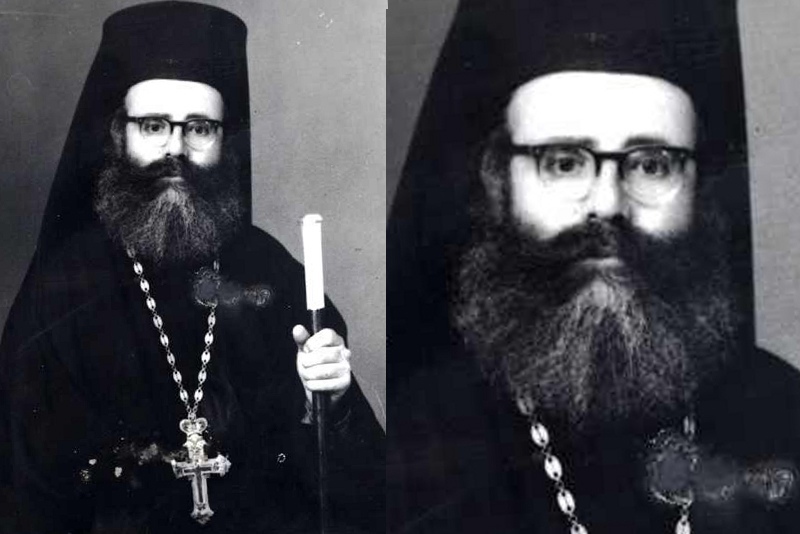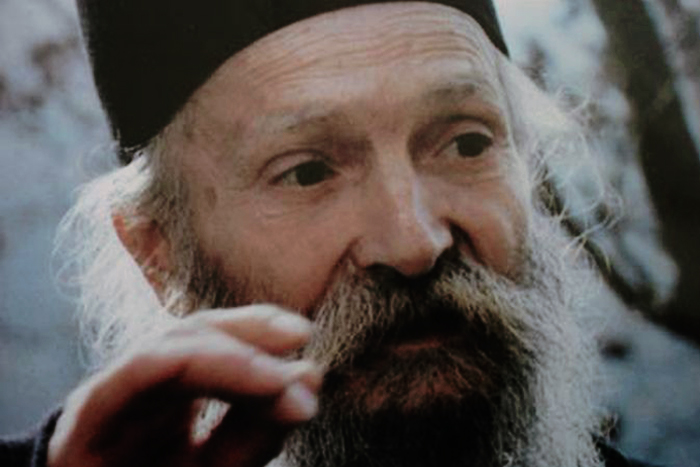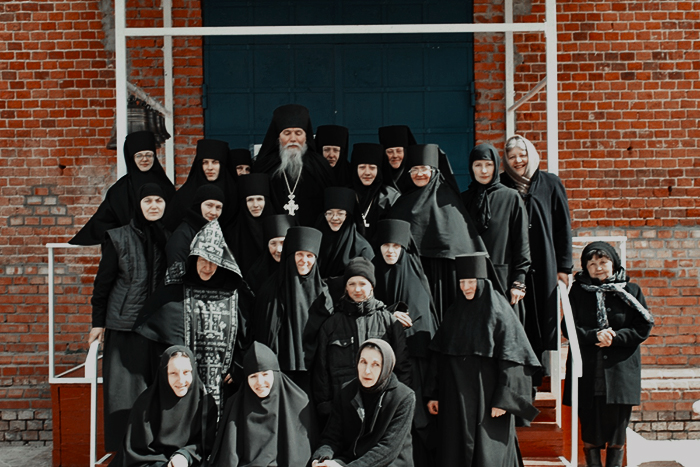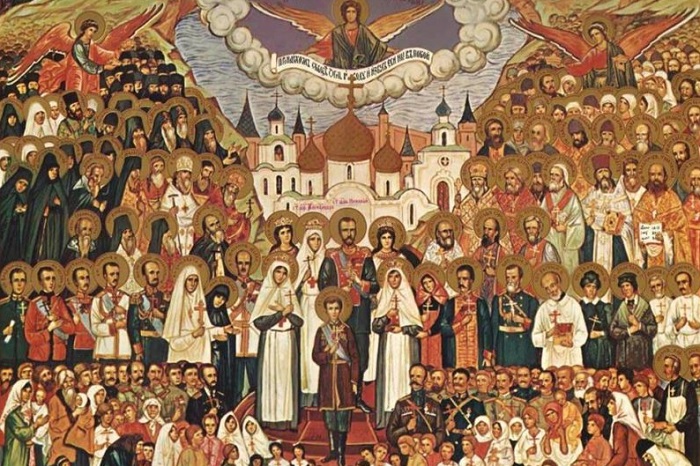
Since 2010, the Russian Orthodox Church has commemorated the Holy Martyr Philoumenos (Hasapis) of Jacob’s Well, who accepted a martyr’s death for Jesus at the end of the 20th century in the Holy Land. He also had a twin brother who also chose the life of a monastic and who became known for his pious life and spiritual exploits. We dedicate this piece to the memory of Archimandrite Elpidios Neoskitiotis, who reposed on 3 December 1983.
He accepted ordination in 1937 and remained on Holy Land for several years. He served as the Hegumen of the Monastery of Saint John the Forerunner, then as the Patriarchal Exarch at Nazareth as was ordained as Archimandrite. Afterwards, he travelled to Athens, where he studied theology and law from 1949 to 1952. After graduation, he served as a priest at the Hospital of the Red Cross in Athens, giving spiritual guidance to patients and staff and to many faithful who asked him for advice.
Sister Kallista, who was working as a hospital nurse during the years of Father Elpidios’s service, remembers: “He had a great love for his patients. Every day, he made a round of the hospital wards. He talked to every patient, finding the right words for everyone to give them spiritual strength and reassurance. He also cared about the relatives of the patients, spiritually and practically. Hegumeness Parasceve adds,
Frequently, he asked the relatives who brought their family members to the hospital if they were having enough to eat, and if not, he either found a way to feed them or offered them to stay in his home and share the food that he had available there. Almsgiving and sharing was his second nature, and he always went out of his way to help all the needy whatever their rank, Hegumeness or a lower-class member of the community.
His service at the hospital took time, but it never distracted him from his monastic duties. He was often seen reading the monastic rule in the hospital courtyard/ Rain or shine, day or night, he stood there praying, prayer beads in his hands.
One morning, he walked into a lift with a member of the hospital administration but kept silent all the time. At first, she was surprised at his visible incivility, as it was untypical of him. Later, when they met again, Father Elpidios apologised, “Maria, please forgive me for not greeting you when we met the other day. I was reading the ninth hour.” Father Elpidios accorded to prayer his utmost attention. At church or in the street, he never stopped praying whatever he was doing. His spiritual disciple Elena recalls, “He taught us to do the same. “He told us that prayer should underlie all our actions… He said that The Lord will enlighten our hearts if we kept praying to Him».
In June 1968, Father Elpidios became the prior of the Hesychastrium of the Holy Theotokos at Rhodopolis. He intensified his spiritual labours to show an example of asceticism to others.
According to Hegumeness Parasceve, he was a role model of life according to the Gospel. He practised incessant prayer and silence and projected love and self-sacrifice. He gave alms extensively, and always in secret. Only when he left for the Holy Mountain did it become known how many people he had helped materially.
A man of versatile talents, he never flaunted them, Keeping humble and modest. |Like his brother Saint Philoumenos, Father Elpidios was an avid reader. As he often repeated to the monastic sisters, the job of a monk is to worship and follow the prayer rule – the rest he should treat as less important. When he was not confessing, he spent his time with a book outside the church. His numerous disciples and visitors remembered him this way.
Metropolitan of Larissa Theologos described the following incident as indicative of his attitude to reading the Psalter. “Sitting together on some occasion, Metropolitan of Stagios and myself asked Elder Elpidios for some spiritual advice. – He thought for a while and then responded, “What can I say?” and proceeded to read enthusiastically the first Cathisma of the Psalter.
Hegumeness Parasceve remembers him taking guidance from the Gospel when he was hearing confessions. He always had the New Testament at hand, and he would often tell us to open an appropriate verse and read it. The lines from the verse always had an answer to our predicaments. At those moments, the elder would add with humility, “They are not my words, they are the Lord’s”
Father Elpidios always taught us what he had learned first-hand from experience. Of the smart prayer, he said, “It is best done in silence by distancing oneself fully from the world. Both are barely feasible these days; even we as monks cannot avoid interacting with the people of the world. To pray in a monastery surrounded by the secular world, a monk must refrain from all judgement and condemnation; and only by doing so can he practise genuine prayer.”
Sometimes, people saw him stamping his foot and saying to himself multiple times, “Doormat, doormat.” “The doormat meant humility. They put it at the door for people to rub their feet on it. Imagining himself in its place, the elder Would remark, with humility, “people are treading on me!” Here is what every monk should be like!”
In addition, Elder Elpidios taught, “In a monastery, we must love everyone equally. We must give our love not only to people to whom we are disposed but to every man and woman, regardless of their personality. We must answer requests from the Hegumeness, but also from every sister. God’s grace will illuminate our lives when we are all in agreement. If you hold a grudge against a sister that you have not forgiven, your prayer will be useless. God will not hear it.”
In 1976, Father Elpidios retreated to the Holy Mountain and spend the rest of his live ascetising in the New Skete of the Cell of the Annunciation of the Theotokos. Father Niphont said of Father Elpidios, “I first met him in the New Skete. He was a true man of God – Simple in demeanour and dressing modestly, he treated others cordially, respectfully and generously. He always compromised, never insisted on his views, and never put any pressure on others. As soon as he knew about any disputes or quarrels among the brothers, he always hurried to restore peace among them. He earned deep respect from others for taking everyone seriously and treating them with kindness. He was like a father to all of us. He was critical and harsh towards himself, and never allowed himself any digressions, particularly from the prayer or worship rule. He always read the Psalter and the Gospel. When he was ill, and I was looking after him, he had me read aloud to him verses from the Psalter and the New Testament. He found them inspiring and thought-provoking. Frequently, he asked me to stop and mused, “Just listen to what it says… O Christ Our Lord, How enormous is Your sacrifice for our sake…”.
He found the experience of serving the liturgy particularly meaningful. During the liturgy, he had the sense of being one on one with the Lord and asked to be left alone in the altar. He conducted the service at a moderate pace; used simple intonations, and read out large numbers of names of the living and deceased during the matins.
On 29 November, the day of his twin brother’s martyrdom, Father Elpidios saw with his spiritual eye from his Skete the events that were unravelling at Jacob’s Well. He later described the details of the incident before the fathers of his brotherhood. To his description, he added, “Saint Philoumenos is a holy martyr. He endured his torments voluntarily, refusing to leave the location of his service to protect a relic from defilement.”
In November 1983, Father Elpidios’s condition deteriorated, forcing him to leave the Holy Mountain. He was admitted to the Red Cross Hospital at Athens, where shortly fell into a coma. His relatives and fathers of the Holy Mountain gathered around his bed.
Metropolitan Athanasios of Limassol remembers, “The elder was in intensive care, lying in a coma. On one of our visits, we noticed him holding on to his prayer beads, picking through them slowly, one after another, like he used to do when he was praying. In astonishment, we asked his doctor if we could believe our eyes. How was it possible for Elder Paisios to keep thumbing through the beads while unconscious. The doctor told us that those were unconscious mechanical movements that he had learned and to which he had accustomed himself in the past. It then occurred to me to try taking away his beads and giving him mine instead. The moment I took his beads, the elder opened his eyes, held out his hand and took back his beads, leaving us and the doctor baffled.
Elder Elpidios departed to God on 3 December 1983. Due to bad weather conditions, it was not possible to bury his remains on the Holy Mount, so it was decided to lay them to rest in his beloved monastery of the Theotokos Faneromene at Rhodopolis Atis. Despite the heavy rainfall, scores of his spiritual disciples came to pay their last respects, and have continued to come to his grave. That way, he never parts with those who seek his guidance and reassurance in body or spirit.
Translated by The Catalogue of Good Deeds
Source: https://spzh.news/ru/istorija-i-kulytrua/84510-arkhimandrit-kotoryj-molilsya-dazhe-v-buduchi-kome




